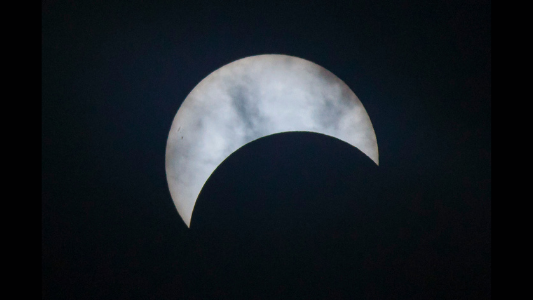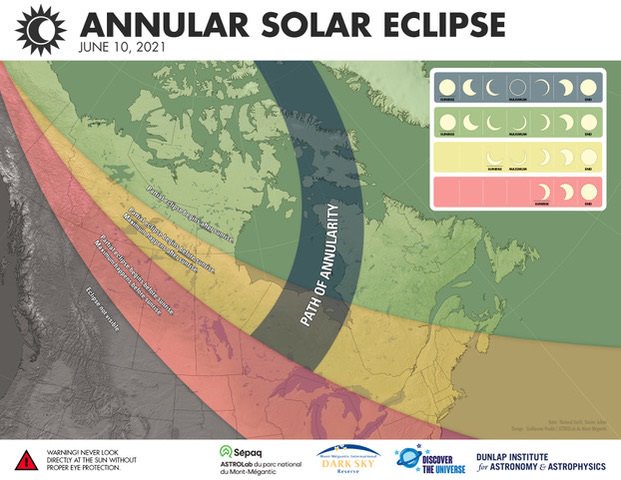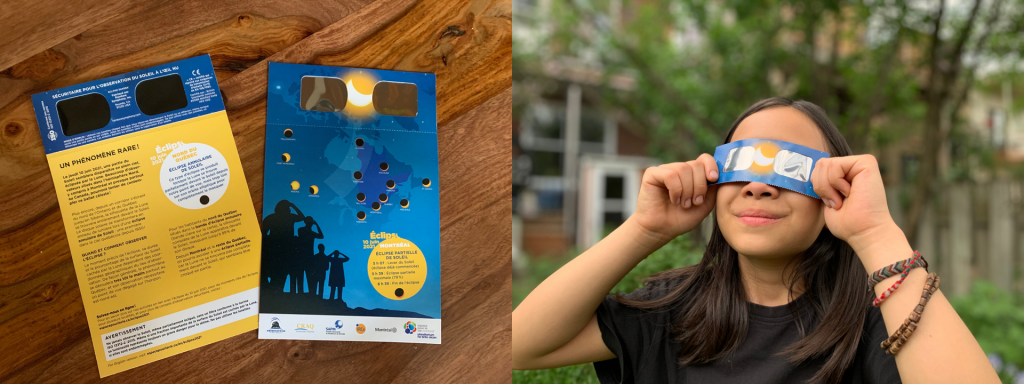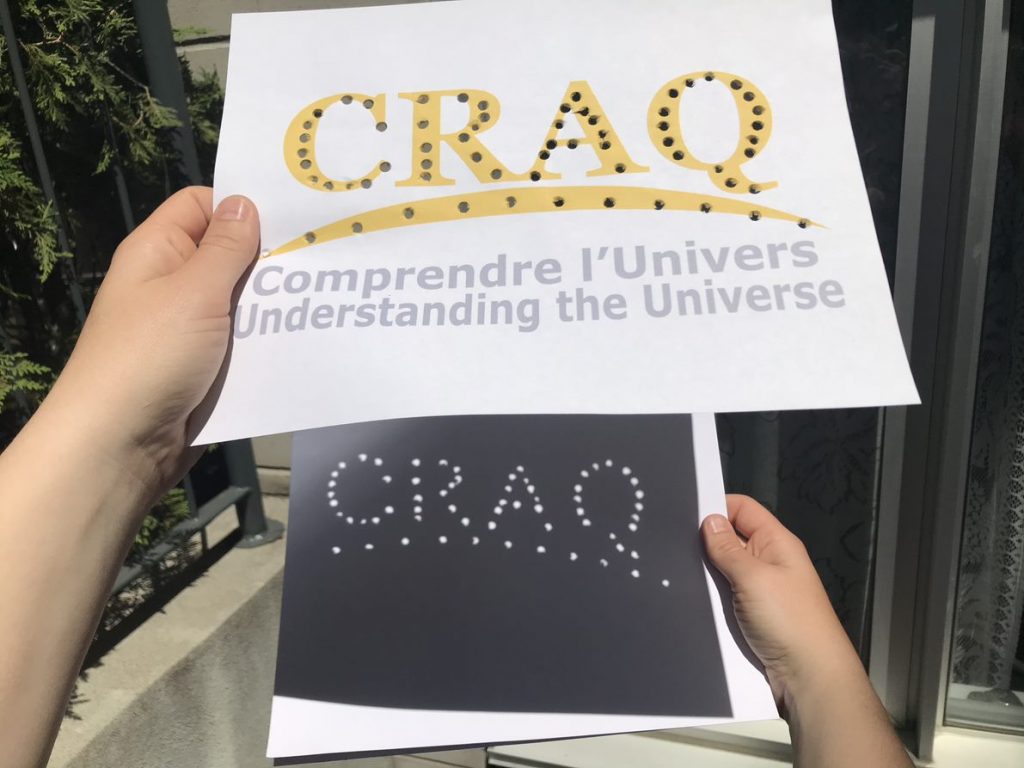A Solar Eclipse on the morning of June 10th 2021
The Centre for Research in Astrophysics of Quebec (CRAQ), the Institute for Research on Exoplanets (iREx) and the Observatoire du Mont-Mégantic (OMM), invite you to admire the solar eclipse taking place at sunrise on the morning of June 10th 2021.
A rare event!

The Sun during the eclipse of August 21st 2017. Credit: Étienne Artigau.

This map shows the different zones where the eclipse of June 10th 2021, will be visible in Quebec: in the dark blue region, the eclipse will be annular, while in the green and yellow regions, it will be partial. In Montreal, which is in the yellow zone, for example, the Sun will already be eclipsed at sunrise. Credit: ASTROLab du Parc National du Mont-Mégantic and Discover the Universe
The astronomical show will be most impressive in a corridor stretching from northern Ontario and Quebec to Siberia, passing through Nunavut, where the Moon’s silhouette will be placed directly on the Sun, hiding its entire centre and leaving only a ring of the Sun visible.
“This is the first time that such an eclipse – an annular eclipse – will be observed in Quebec sky’s since 1930! “adds Nathalie Ouellette, Coordinator of the iREx.
Want to see the show?
The Institute and its partners are participating in several initiatives to encourage you to get up early on June 10th to enjoy this rare event!
Careful! Never observe the Sun directly, during an eclipse or at any other time. Even partially eclipsed, the Sun is still a serious danger to your eye’s retina.
“To observe the Sun safely you must use a solar filter that allows only a tiny fraction of the light to pass through, in accordance with the standard [ISO 12312-2: 2015], or observe the show indirectly, using a projection mechanism. “explains Frédérique Baron.
Solar viewers distributed free of charge in Montreal’s libraries

Information cards with a detachable filter are available in several libraries in the city of Montreal. The filter allows for safe observations of the Sun.
Credit: Space for Life.
To obtain an information card with a detachable filter that allows you to look at the Sun safely, you can also go to the Bibliothèque des sciences at the campus MIL’s Complexe des sciences, at the Bibliothèque de mathématiques et informatique in the André-Aisenstadt Building, or to your local Montreal library. Most of them will be distributing the filters starting June 1st. Hurry! Quantities are limited!
The Eclipse Challenge, a fun way to observe the eclipse

You can create a customised projection simply with two sheets of paper, as in this example with the logo of the CRAQ. Credit: CRAQ.
“One might think it’s complicated to create a projection system to observe a solar eclipse safely, but it’s not! ” Marie-Eve Naud, Scientific Coordinator for Education and Outreach of the iREx and Project Manager for Discover the Universe, explains. “We can make one in less than a minute with two sheets of paper and a sharp object like a pencil, use a colander or a hollowed-out utensil, or even without any material at all, using our hands! “.
Two iREx summer interns, Sarah Thiele and Maude Larivière, have created short video clips to show you how to build an observation tube.
To guide you on June 10th, listen to The Astrophysicists podcast!
On the day of the observation, go – ideally before sunrise! – to a spot where the horizon is clear in the East-North-East direction. To guide your observations, a special episode of “Les Astrophysiciennes” podcast will be online early in the morning of June 10th.
Our astrophysicists Frédérique Baron and Nathalie Ouellette, as well as contributors from Space for Life and Discover the Universe, will be on the air to tell you more about solar eclipses.
On the morning of June 10th, grab your solar filter or projection device, listen to Les Astrophysiciennes, and come out to see the eclipse!
For more information
Frédérique Baron, astrophysicist
Scientific Mediator
Institute for Research on Exoplanets, Observatoire du Mont-Mégantic, Université de Montréal
frederique.baron@umontreal.ca
Nathalie Ouellette, astrophysicist
Coordinator
Institute for Research on Exoplanets, Université de Montréal
nathalie.ouellette.2@umontreal.ca
613-531-1762
Marie-Eve Naud, astrophysicist
Scientific Coordinator for Education and Outreach
Institute for Research on Exoplanets, Université de Montréal
Project Manager
Discovering the Universe
marie-eve.naud@umontreal.ca
514-279-3222
